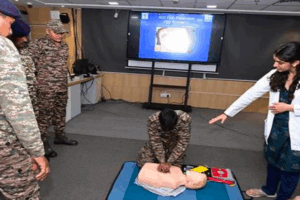The National Green Tribunal Tuesday issued notice to the Centre and the CPCB on a plea seeking quashing of a notification on groundwater extraction on the grounds that its commercial use was adversely affecting the flow of rivers and availability of drinking water in the country.
A bench headed by NGT Chairperson Justice Adarsh Kumar Goel said the Central Ground Water Authority (CGWA) was repeatedly issuing notification liberalising ground water extraction in water scarcity areas in spite of the need for stringent action, contrary to the very purpose for which it was setup.
There was no effective mechanism to check violation by recovery of adequate compensation which was laid down by this tribunal based on expert studies, it said.
“We find that the impugned order is statutorily appealable under Section 16 (g) of the NGT Act, 2010. Thus, instead of an application, proper remedy of the appellant is an appeal. We direct conversion of the application to Appeal.
“The Registry may accordingly register the matter as Appeal. We are of the view that there are arguable points which are raised in the appeal which will require reconsideration. The appeal is admitted. Issue notice to the Ministry of Jal Shakti,” the bench said.
The tribunal also issued notice to the Central Pollution Control Board (CPCB), and said water is a scarce resource on which life is dependent and its extraction has to be duly regulated.
In areas where there is water scarcity, extraction can be allowed on stringent conditions of ensuring recharge, it said.
“The appellant may serve notices with complete set of papers and file an affidavit of service within one week. The response may be filed within six weeks,” the bench said.
The tribunal was hearing a plea filed by environmentalist Devi Das Khatri challenging the notification issued by CGWA which issued guidelines to regulate and control the ground water extraction in the country under Section 3 (3) read with Section 5 of the Environment (Protection) Act, 1986.
The plea said that extraction in scarce water areas for commercial purposes was against the principle of ”Sustainable Development”.
The applicant has pointed out that without any study of carrying capacity, the policy allows concession to Micro and small enterprises drawing ground water less than 10 cubic metre per day as well as for bulk water supply.
There is no uniform policy for monitoring ground water recharge mechanism and to check the depleting ground water levels in the country, the petitioner said.
Extraction for commercial purposes was adversely affecting not only the river flow but also availability of water for drinking purposes, the plea said, adding that no effective regulatory mechanism had been set up.
According to the applicant, the impugned Notification, instead of complying with the directions of the tribunal, is in reverse direction and destructive of concept of ”Sustainable Development”.





Add Comment